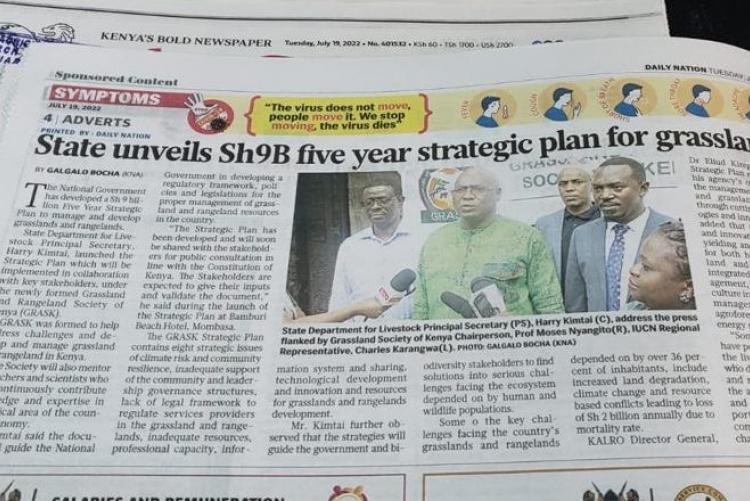The National Government of Kenya has unveiled a five-year Strategic Plan to manage and develop grassland and rangeland. State Department for Livestock Principal Secretary, Harry Kimtai, launched the Strategic Plan, which will be implemented in collaboration with key stakeholders, under the newly formed Grassland and Rangeland Society of Kenya (GRASK) under chairperson of Prof. Moses Nyangito, Dean Faculty of Agriculture and Associate professor at the Department of Land resources management and Agricultural Technology( LARMAT)
GRASK was formed as part of resolutions of the joint 24th International Grassland and 11th International Rangeland Virtual Congress held in October this year, to help address challenges and develop and manage grassland and rangeland in Kenya. The Society will also mentor researchers and scientists who will continuously contribute knowledge and expertise in the critical area of the country’s economy.
Strategic Plan
The Strategic Plan whose implementation is projected to cost approximately Sh9 billion, was developed by a team from the State Department of livestock, Kenya Agricultural and Livestock Research Organization (KALRO) and the University of Nairobi. It will guide the National Government in developing regulatory framework, policies and legislations for the proper management of grassland and rangeland resources in the country.
“The Strategic Plan has been developed and will soon be shared with the stakeholders for public consultation in line with the Constitution of Kenya. The Stakeholders are expected to give their inputs and validate the document,” said Mr. Kimtai.
The GRASK Strategic Plan contains eight strategic issues of climate risk and community resilience, inadequate support of the community and leadership governance structures, lack of legal framework to regulate services providers in the grassland and rangelands, inadequate resources, professional capacity, information system and sharing, technological development and innovation and resources for grasslands and rangelands development.
Kimtai further observed that the strategies will guide the government and biodiversity stakeholders to find solutions into serious challenges facing the ecosystem depended on by human and wildlife populations.
Some of key challenges facing the country’s grasslands and rangelands depended on by over 36 percent of inhabitants, include increased land degradation, climate change and resource based conflicts leading to loss of Sh2 billion annually due to mortality rate.
“These ecosystems support our grazing livestock as wildlife habitat, watersheds, recreation minerals, plant products and other associated uses. Despite all these benefits, the lands have continued to lack the basic foundations for social and economic development and the expected roles of ensuring food and nutrition security,” he added.
- Log in to post comments

